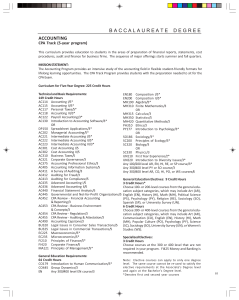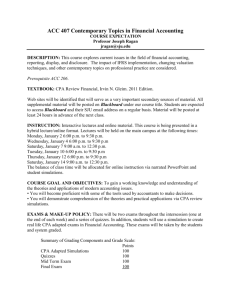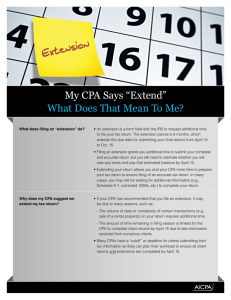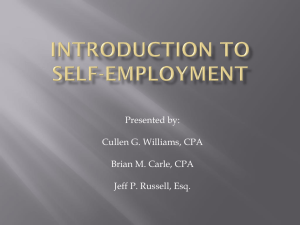The Consumer Protection Act
advertisement
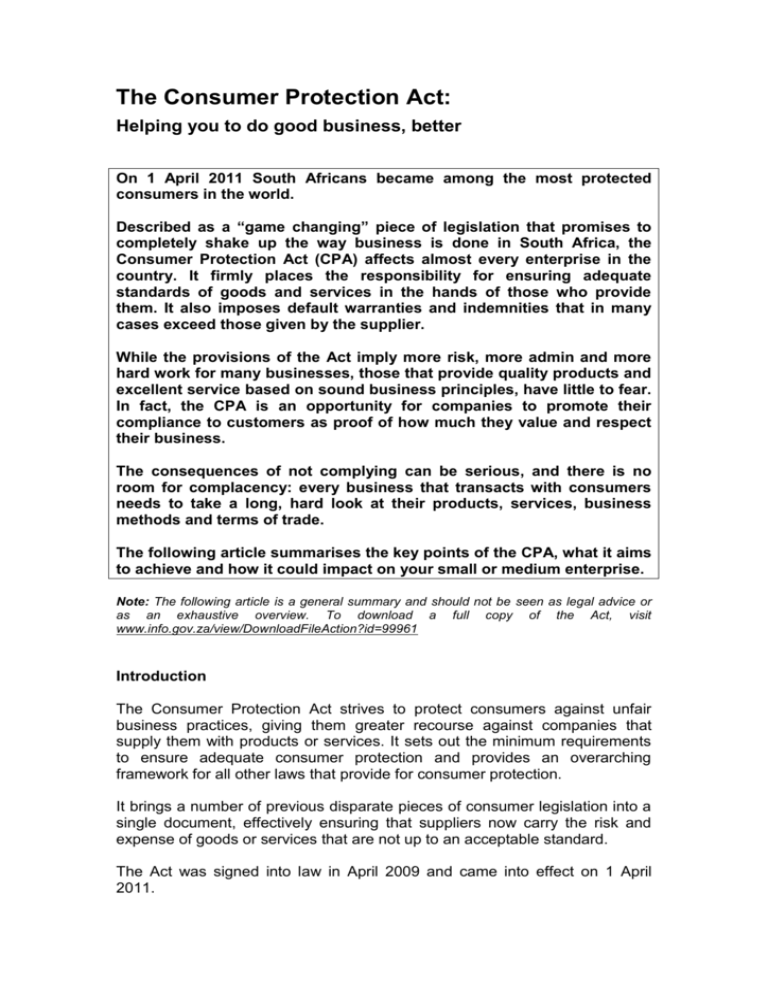
The Consumer Protection Act: Helping you to do good business, better On 1 April 2011 South Africans became among the most protected consumers in the world. Described as a “game changing” piece of legislation that promises to completely shake up the way business is done in South Africa, the Consumer Protection Act (CPA) affects almost every enterprise in the country. It firmly places the responsibility for ensuring adequate standards of goods and services in the hands of those who provide them. It also imposes default warranties and indemnities that in many cases exceed those given by the supplier. While the provisions of the Act imply more risk, more admin and more hard work for many businesses, those that provide quality products and excellent service based on sound business principles, have little to fear. In fact, the CPA is an opportunity for companies to promote their compliance to customers as proof of how much they value and respect their business. The consequences of not complying can be serious, and there is no room for complacency: every business that transacts with consumers needs to take a long, hard look at their products, services, business methods and terms of trade. The following article summarises the key points of the CPA, what it aims to achieve and how it could impact on your small or medium enterprise. Note: The following article is a general summary and should not be seen as legal advice or as an exhaustive overview. To download a full copy of the Act, visit www.info.gov.za/view/DownloadFileAction?id=99961 Introduction The Consumer Protection Act strives to protect consumers against unfair business practices, giving them greater recourse against companies that supply them with products or services. It sets out the minimum requirements to ensure adequate consumer protection and provides an overarching framework for all other laws that provide for consumer protection. It brings a number of previous disparate pieces of consumer legislation into a single document, effectively ensuring that suppliers now carry the risk and expense of goods or services that are not up to an acceptable standard. The Act was signed into law in April 2009 and came into effect on 1 April 2011. Who is affected? The CPA covers both products and services, which means it applies to anyone who manufactures or sells something. Interestingly, the Act defines a “consumer” as including a juristic (legal) person (such as companies, trusts, partnerships and similar) if that person’s asset value or annual turnover is less than R2 million a year. In other words, small businesses and sole proprietors who fall within this turnover, now enjoy the same protection from their suppliers as the individual consumer does. Another important aspect of this definition is that in terms of the CPA, a consumer is not only the person to whom goods or services are promoted or sold, but also the actual user. This means that anyone who uses an item has recourse for complaint even if they are not the one who actually bought it. To which areas of business does the CPA apply? The provisions of the CPA are far reaching and affect not only what you offer your customers, but also how you offer it. The regulations can be roughly grouped into the following 10 areas: 1. Language The Act does not specify that particular official languages have to be used when giving consumers information about your product or service. It does stipulate that the language has to be appropriate for the people at which your product or service is aimed. It also has to be understandable to someone with average literacy skills and experience. How this affects you: You might have to relook at the “fine print” in any written material to ensure that important facts are not hidden, but are clearly and obviously stated. You might also have to review any technical documents, particularly financial or legal wording, to ensure that any complex concepts or jargon is reworded into simpler and more easily understandable phrases. 2. Agreements Agreements have to be fair. In terms of the CPA, any agreement that seems excessively one-sided in favour of anyone other than the customer can be ruled to be unreasonable and unjust. Once this happens, the customer is no longer bound by that agreement. If an agreement is set out in writing, it must include details of the customer’s financial obligations, and you have to give them a free printed copy or access to an electronic copy. If it is not in writing, then you must keep some other form of record of the transactions that you have entered into with that particular customer. This could include, for example, audio recordings of any agreements you make over the phone. Part B of the CPA also covers franchise agreements, stipulating a number of special requirements. These include detailing the services that you offer as a franchisor, as well as a clause about the general principles of honesty and equity that guide the franchise agreement. While the requirements are extensive and may seem onerous to a franchisor, they provide a valuable “tick list” of best practices for this sector. Also note that lessees are seen as consumers, and therefore any lease agreement has to comply with the CPA (see point 3). If it does not, a court can order you to redraft it as well as any other consumer-related agreements or terms of business. How this affects you: You need to review all written agreements that you currently have with your customers to identify any areas that could be interpreted as unfair to the customer (whether that customer is an individual or another small business) or one-sided in your favour. If you are a franchisor, you have six months from 1 April 20111 April 2011 to change your existing franchise agreements. 3. Contract terms and renewals The CPA includes a lengthy description of terms and conditions that it says could be considered unfair or unreasonable, and should not be included in a contract or agreement. However, this is open to some interpretation. Err on the side of caution, and draft any terms and conditions bearing the above point 2 in mind. A key change relating to contracts is that the Act forbids the automatic renewal of fixed-term agreements. Once such a contract nears the end of its term, you have to give your customer notice, and, on expiry, the option to renew it for another fixed term, change the terms, or cancel it. Until the consumer makes that decision, you can only renew the contract automatically on a month-to-month basis. During this time, the consumer has the right to cancel it at any time by giving you 20 business days’ notice in writing. How this affects you: You have to remind your customers of the expiry date of any fixed-term contract at least 40 business days in advance. If your customer wants to cancel the contract before this fixed term ends, they have to pay any outstanding amounts. You have the right to charge a reasonable cancellation fee. This is limited to 10% of the unexpired portion of the contract. Also note that unlike the rest of the Act, the portion dealing with fixed-term contracts and renewals applies to “natural” persons only – that is, individuals and not legal entities. 4. Cooling-off period The good news for impulse buyers, but not necessarily for direct marketers, is that consumers who buy something in a transaction that was not initiated by them (that is, if the product is marketed to them directly, by post or email) then they have a five-day “cooling-off” period in which to return the item. If the consumer feels that they didn’t have enough time to examine the product properly before buying it (for example, in the case of goods that are ordered online and delivered by courier), then a 10-day return period applies. How this affects you: As the supplier, you will have 15 days in which to pay back your customer in full for any returned product, from the time that they notify you in writing. The customer has to return the item to you at their own cost, and you don’t have to pay them back until you have received it. However, there is a proviso: if you sell goods online, you have to deliver them at an agreed date, time and place, failing which the customer has the right to cancel the sale. If the goods don’t match the sample or description, the customer has the right to return them at your expense. 5. Refunds, repairs and warranties The Act creates what is known as an “implied warranty”, which means that producers and distributors are expected to supply goods that meet the standards and general quality that is envisaged in the Act. In practice, this means that consumers now have up to six months to return faulty or unsafe goods, regardless of the warranty that the seller might provide, and in addition to any other warranty or condition imposed by any other legislation. The only time this would not apply is when the consumer has tampered with the product or if the problem is due to gross negligence. As a supplier, you can choose to repair the returned product, replace it, or refund your customer in full. If the product fails again within the next three months – whether for the same or a different reason – you have to replace it or refund the purchase price. When it comes to repair work that falls outside implied or other warranties (for example, if you run a business that offers an appliance repair service), the CPA also has specific requirements. Before doing any repair work, you have to first give your customer a written quote for their approval. You cannot charge for preparing the quote (unless your customer agrees to it) nor can you charge more than what you have quoted. Any additional work has to be quoted for each time. The Act also provides for a three-month warranty on repaired goods. Linked to the concept of implied warranty, is that of “voetstoots” or buying on the basis of “what you see is what you get as is”. According to the CPA, “voetstoots” is no longer acceptable. A seller has to tell consumers of any product defects – obvious or hidden – and they have to agree to buy it in that condition. Perhaps one of the most significant aspects of the new Act relates to product liability: if a consumer claims damages of any kind as a result of an unsafe, faulty or hazardous product, it is up to you, as the supplier, to prove that you are not at fault – regardless of whether you have actually been negligent. Any producer, importer, distributor or retailer can be held liable (either individually or jointly) for any harm caused by such a product, or even as a result of inadequate warning labels or usage instructions. How this affects you: Your customers can claim against you for damages relating to death, injury, illness, loss or damage to property, or even economic loss as a result of any of these. The onus is on you to prove you were in no way responsible. The good news, however, is that the Act provides for a number of defences that you can use in this instance. You cannot afford to wait until a liability action is brought against you or you are forced to recall a product. Speak to your financial adviser about putting a policy in place not only to cover the key expenses incurred, but also to give you access to expert advice from appropriately qualified consultants who can guide you through the recall or liability process. Another point to bear in mind (especially important for retailers of certain goods, such as computer equipment) is that the sale of “grey goods”, that is, those imported without the authorisation of the manufacturer, and which therefore do not enjoy the same warranty or technical support, must be clearly communicated through signage on the shop floor. That said, all “grey goods” still fall within the implied warranty imposed by the CPA. 6. Overbooking, reservations and cancellations Consumers still have the right to cancel a booking or reservation, and you have the right to charge a cancellation fee. The Act stipulates that this must be a “reasonable” fee, based on how early the cancellation was made and how easy it will be for you to fill that now-empty spot. For example, if there is more than enough time to find a new occupant for a hotel room or seat on a plane, then little to no cancellation fee should apply. If the booking is cancelled at the very last minute, you may charge a higher fee. If a cancellation is due to the death or hospitalisation of the person who made the booking, then you may not charge anything. The Act also provides a “reasonableness” test for overbooking or overselling – welcome news, perhaps, to travellers who are tired of regularly being bumped off over-full flights. Simply put, the Act states that you are not allowed to accept payment for goods or services if you have no reasonable intention of supplying them, or if you intend supplying goods or services that are materially different to those that have been paid for. How this affects you: If you run an airline that bumps a business traveller off a flight, you would be liable for the amount they had already paid for the ticket, plus interest, plus any other direct costs incurred (such as a rental car not collected on time). You would not be liable for potential or “anticipated” lost business resulting from that customer missing a business meeting. 7. Marketing Consumers will be breathing a sigh of relief at the provision that enables them to pre-emptively block any direct marketing attempts, whether this is by email, phone or printed material in the post. In terms of the CPA, a consumer has to first be informed that a company wants to market to them directly. The consumer has to agree to this before the business can start communicating with them. It is envisaged that this will be managed through an “opt-out” registry (still to be set up), through which marketers will apply for permission before sending direct marketing communication to a person. Any confirmation from this registry will be copied to the consumer, giving them another opportunity to opt out if they have not done so. The Act allows for paper “junk mail” to be blocked by consumers by simply placing a “no junk mail” notice on their post boxes. The regulations also give parents of minors the right to block access to direct marketing, even if the minor has approved or specifically asked for that marketing material. The CPA cracks down on numerous marketing techniques, including SMS- or MMS-based promotional competitions. Although the competitions are still permissible, you can only charge entrants standard SMS rates, as opposed to the R5 or R10 that is often charged to help cover costs. Additionally, consumers who qualify for prizes (the minimum value being set at R1) must sign acknowledgement of receipt of these prizes and supply their identity numbers. How this affects you: If direct marketing is part of how you do business, you will have to put measures in place to record your existing and/or potential customers’ preferences in terms of what they are prepared to receive and when – and at no extra cost to the consumer. You will also have to stick to these. A further marketing-related regulation relates to the issuing of prepaid certificates, credits and vouchers. In terms of the Act, gift or similar vouchers can only be considered “expired” once they are redeemed by the bearer or three years from the date of issue. Linked to this is the issue of loyalty programmes. If you run such a programme, the Act allows you to restrict the availability of the goods or services that can be redeemed with loyalty points during certain periods of the year (for example, during high season if you are an airline or hotel business). This restriction can only last for a maximum of 90 days. For the rest of the time, you are not allowed to give cash-paying customers preference over those who have loyalty credits. You also have to communicate clearly he nature of the programme, the goods or services to which it applies, the steps required to receive those benefits, as well as the time, venue and people that should be contacted to join or benefit from the programme. 8. Safety monitoring and recall The Act offers a new take on safety monitoring, in that it requires the National Consumer Commission to promote the development and adoption of codes of practice that guide how different industries monitor the safety of their products. Note that this Commission has the power to instruct an importer or producer to recall a product if it has reasonable grounds to believe that the product is unsafe, or if the business has not taken the necessary steps to ensure public safety. How this affects you: Industries (and the companies operating within them) will have to implement and comply with systems to receive and investigate complaints, recall goods and report on certain matters to the National Consumer Commission. Very important to remember is that these safety monitoring regulations (as outlined in section 60 of the Act) apply to all transactions, even those few that are considered to be exempt from the CPA. The latter currently includes: goods or services that are supplied to the state; any transaction seen as a credit agreement under the National Credit Act (although related goods and services still fall within the CPA); transactions relating to services that fall within an employment contract; and transactions that give effect to a collective bargaining agreement as described in the Constitution and Labour Relations Act. 9. Your trading name Customers deserve to know exactly who they are dealing with. The Act stipulates that you can no longer use a “trading as” name that is not related to your registered name. How this impacts you: Any business name that you want to use for trading in any way or form must now be registered. 10. Disclosures and intermediary services Consumers now have the right to know about any money that an intermediary (such as an agent and possibly a distributor) makes from a sale. For example, sales agents who are independent contractors, rather than employees of the supplier, need to tell consumers exactly how much commission they earn off each sale. How this affects you: If you act as an agent, there is a long list of disclosures in the CPA that you have to make – both to your customer and to the principal on whose behalf you act. If you are a principal with agents or distributors working for you, you have to make sure that they are aware of and stick to these guidelines; otherwise you could be held liable. Interestingly, while the CPA does not apply to advisory or intermediary services that are governed by legislation such as the Financial Advisory and Intermediary Services Act, it does state that the Long- and Short-Term Insurance Acts of 1998 must be brought in line with the provisions of the CPA (for example, in terms of things like plain language usage, fair terms and conditions, and similar requirements.) If these two acts are not aligned with the CPA within 18 months, the CPA will apply to all services that they cover. Conclusion The CPA is far-reaching and covers more than the areas discussed in this article. In striving to remove unethical or unfair conduct from the marketplace, the regulations also describe a number of business practices that are now outlawed or heavily regulated, for example, speculative software (the type used to supposedly predict movements in share prices), property syndication schemes, alternative work schemes and the so-called 419 Internet schemes. The Act also regulates auctions, specifically requiring auctioneers to keep records of all bids, including those over the Internet and where a bidder acts on behalf of another. In short, the CPA is like a “bill of rights” for the consumer. Designed to protect the poor and vulnerable, it not only gives South African consumers a far bigger stick to wield over unscrupulous suppliers, it also places a heavier burden on businesses that do not comply with best practice and good ethics. Familiarise yourself with the Act sooner rather than later and remember: legislation is never a substitute for good customer relations, proper communication and sound business practices. To lodge any complaints, consumers can contact the National Consumer Commission (NCC). Share Call Number: 0860 266 786 Fax: 0861 515 259 Primary information sources: www.thedti.gov.za www.accountancysa.org.za (article by Dr Johan Erasmus, BLC, LLB, LLD) www.iol.co.za (various articles) www.michalsons.co.za www.engineeringnews.co.za (various articles) www.2bbusiness.co.za (article by Ann Williams) DLA Cliffe Dekker Hofmeyer (“Update” Winter 2009)
